A special day from the hilly terrain of Batang Ai.
This is a story about a wild orangutan that peed all over me. I thought I should get it out there, to prepare you.
Don’t say that I didn’t warn you.
The day started out as any other. My team and I awoke before daybreak, to prepare yet another day of surveying six kilometres of hilly terrain for orangutan nests. I passionately loved my job as a researcher for the Wildlife Conservation Society, by the way.
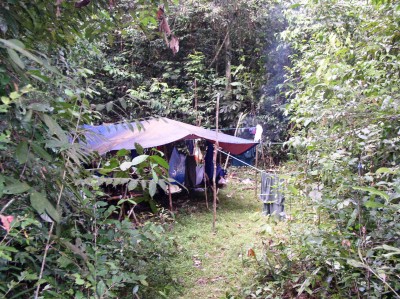
Weeks of camping with an all-male team of field assistants picked from the nearby longhouse, chilly nights, trekking with a heavy backpack through very hilly terrain of the Batang Ai and Lanjak-Entimau protected areas of Sarawak, drenched monsoon afternoons huddled by a tree while clutching myself for warmth, bathing in cold rivers, going places where very few have been to see the most beautiful sights and wildlife. That was my life for many years, and it felt so normal.
So anyway, while eating yet another field breakfast of rice and salted fish, and crouching by the campfire for warmth, Nyanggau says to me, with a mysterious smile, “Today is going to be a special day.”
I should introduce Nyanggau. Nyanggau is like my Iban dad. My hero of the Batang Ai lands. He is the most hardworking assistant I’ve ever had, the most natural leader. He’s also an adventurer, having lived a life of a (now reformed) illegal logger who was once caught in Sarawak-Kalimantan border, and sent to jail. When he first told me this story, he told it very mournfully while skillfully side-stepping the Very Important Bit about the real reason he was arrested. I was very upset on his behalf, and railed about the injustice of indigenous peoples being incarcerated (try to say this three times fast) for no good reason.
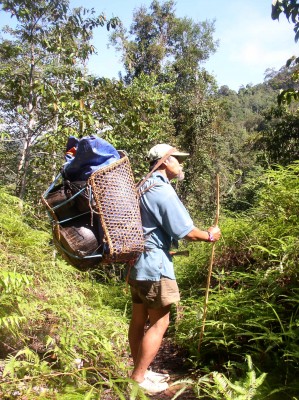
Only later did I find out from a fellow assistant who hissed to me that Nyanggau, in this case, was not the maligned Orang Asal I thought he was.
Since then, I had become a more careful listener of Nyanggau’s stories and tales of portents.
“What do you mean?” I ask, trying to hide the note of suspicion in my voice.
“I had a dream about an orangutan. This is good because perhaps we might see one today.”
At this point, I should let you know that seeing wild orangutans is pretty rare, no matter how much time you spend in the forests. Orangutans are solitary, elusive primates and therefore extremely hard to survey. To see a wild orangutan, even if it is fleeing, or crashing branches and making threatening gestures at you, is one of the more exciting sights in the field for a primatologist.
Nyanggau’s dream made me smile, and hope. It had been weeks since we saw one, and I was missing my large, hairy red ape.
Trekking on a hilly slope, with damp clothes and shoes that could never seem to dry, while looking out for orangutan nests on a misty early morning, is the best feeling. I pity the fools who have to slog through morning traffic, and sit at their cubicles all day. I’d trade heels for kampung adidas any day.
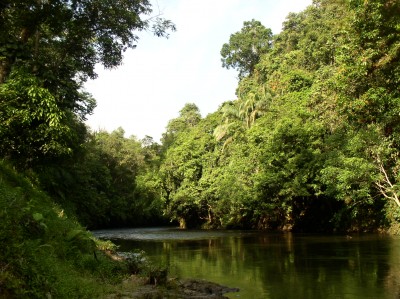
It was almost mid-day, and nearing the end of our survey, when I turned to Nyanggau to complain that we hadn’t seen an orangutan yet.
“Be patient. We haven’t finished this survey yet. Look, there’s a new nest over there, see?”
Spotting a new orangutan nest, is the second most exciting thing to seeing a wild orangutan itself. Most people aren’t aware that orangutans make nests on trees, for they certainly do! Orangutans build nests to sleep in, during the night, and day. They take their time to build one, breaking tree branches, and making sure that the nests are full and leafy. Orangutans are similar to us, in that respect — wouldn’t you want a comfy bed to sleep in?
The nest that Nyanggau was pointing at was a beautiful specimen.
“It’s just been recently built,” I speculate out loud, “Look at the very green leaves, and snap of the branches. Brand-new! Possibly even just last night!”
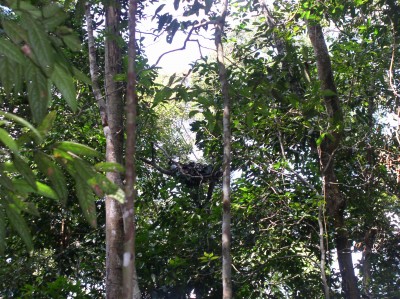
Growing more excited at the thought of an orangutan still roaming in the area, I walk around the tree with my binoculars firmly attached to my eyes.
“About 10 metres high, wow it’s pretty high up… 2×3 perhaps? Definitely stage 1. Tree species, can you help me out, Nyanggau?”
My monologue ceased when I realised that my entire team was not only very silent, but also very huddled in a tight group from a distance away, looking at me with very wide eyes.
“Don’t. Panic.” Nyanggau says softly, and in English, “Come. Here. Very. Slowly.”
These are the words, one does not want to hear, while in the jungle, especially when her team is a distance away from her. While Nyanggau was beckoning me to come towards him, my other assistants, with very wide eyes, point with their fingers up in the air.
I could not help but slowly look up, to see a large wild male orangutan inching his way down on the tree trunk, with an long hairy arm outstretched to grab at me.
I yelp, and without much grace, tried to scramble out of his way.
Soon there was an all-out Iban kerfuffle which involved previously-huddled Iban men roaring towards me, and me, running in circles, trying to get out of the orangutan’s grasping reach but at the same time, idiotically still being in the way.
Frustrated, the orangutan gives up and makes haste away from excited Iban men, but not before leaving me a generous present of amber-coloured liquid waste.
“Nyanggggaaaaauuuuuuuuuuu” I wail, drenched, as my team, not very successfully, tried to stifle their giggles.
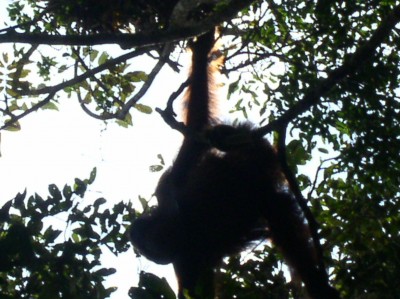
Walking back to base camp was a humbling experience, having to listen to my field assistants gleefully talking about how their boss stinks, no, she really really stinks.
“I told you today would be a special day,” says Nyanggau with a huge smile.
Secretly, I agreed, but next time, I’m making Nyanggau stand by the tree.
June Rubis is a Malaysian conservationist from Sarawak, where she was born and raised. Her work has taken her from commencing the first long-term fieldwork on wild orangutans in Batang Ai National Park, and Lanjak-Entimau Wildlife Sanctuary for the Wildlife Conservation Society (WCS-Malaysia), to heading the Conservation department of the Malaysian Nature Society in Kuala Lumpur, and most recently, she has returned from an 18-month stint managing an EC-funded programme for the protection and conservation of Lamandau Wildlife Reserve, Central Kalimantan, Indonesia. Her professional interests include bridging the gap between conservation and indigenous communities issues, particularly in her home island of Borneo. She is also interested in building networks and facilitating relationships between local peoples (particularly women and youth) of the Asia Pacific working on conservation, environment sustainability, and indigenous communities issues. She is of Krokong-Bringing (Dayak Bidayuh) and Filipino (Tagalog) descent. She tweets at @j_rubis.

Thank you all for the kind comments! No picture of me drenched in pee, I was much too indignant.
Yes next time, I would bring Fahri as offering!
June – page 678 of the Orangutan manual states you now gotta marry that male who blessed you with his pee.
same same if he pee-d on Fahri too.
i won't wander back to his territory if i was you.
unless you bring Fahri as an offering.
Marcus: Absolutely correct! I think maybe Lord Bobo had something to do with the golden shower!
TY: I feel you man, but we're not that kinda site!
Only thing missing is a photo of you drenched in pee!
kampung adidas rocks!
i haven't had an orangutan pee on me before, but had a mother and child eat breakfast and drop leaves and seeds on me :)
What amazing luck! I envy you, June. I'll bet being pee'd on by a maias gives you good fortune for a year!
June: A thoroughly enjoyable read. I’m not as experienced in golden shower stories as Fahri is, but really, please continue to write up more of your experiences, which gives all us city-folk a glimpse into a world most of us have never experienced. I’ll be glad to reciprocate with some stories about traffic jams and crowded shopping malls if you’d like!
Fahri: It did indeed prove to be an indication of imminent good luck, as she went on to get chatted up by a notoriously persuasive individual on Twitter, and meet the LoyarBurokkers, no?
Dear June, a delightful golden shower story that certainly warms the head if not the heart! I understand from my Chinese relatives that such an event is a sign of good luck (i.e. anything falling from the sky and on to your head – except maybe a piano) and one should immediately try to manifest it by buying 4D/the lottery. It is too bad there wasn’t a betting shop near the orang utan nest to allow you to ‘cash in’ on your golden fortune!
Hi June!! Reading your article, so well written with facts and humour,has made my morning feel so real.Malaysian news these days makes me feel so helpless, with all the going ons in this part of Malaysia.Thank you for giving me my world back.God Bless.